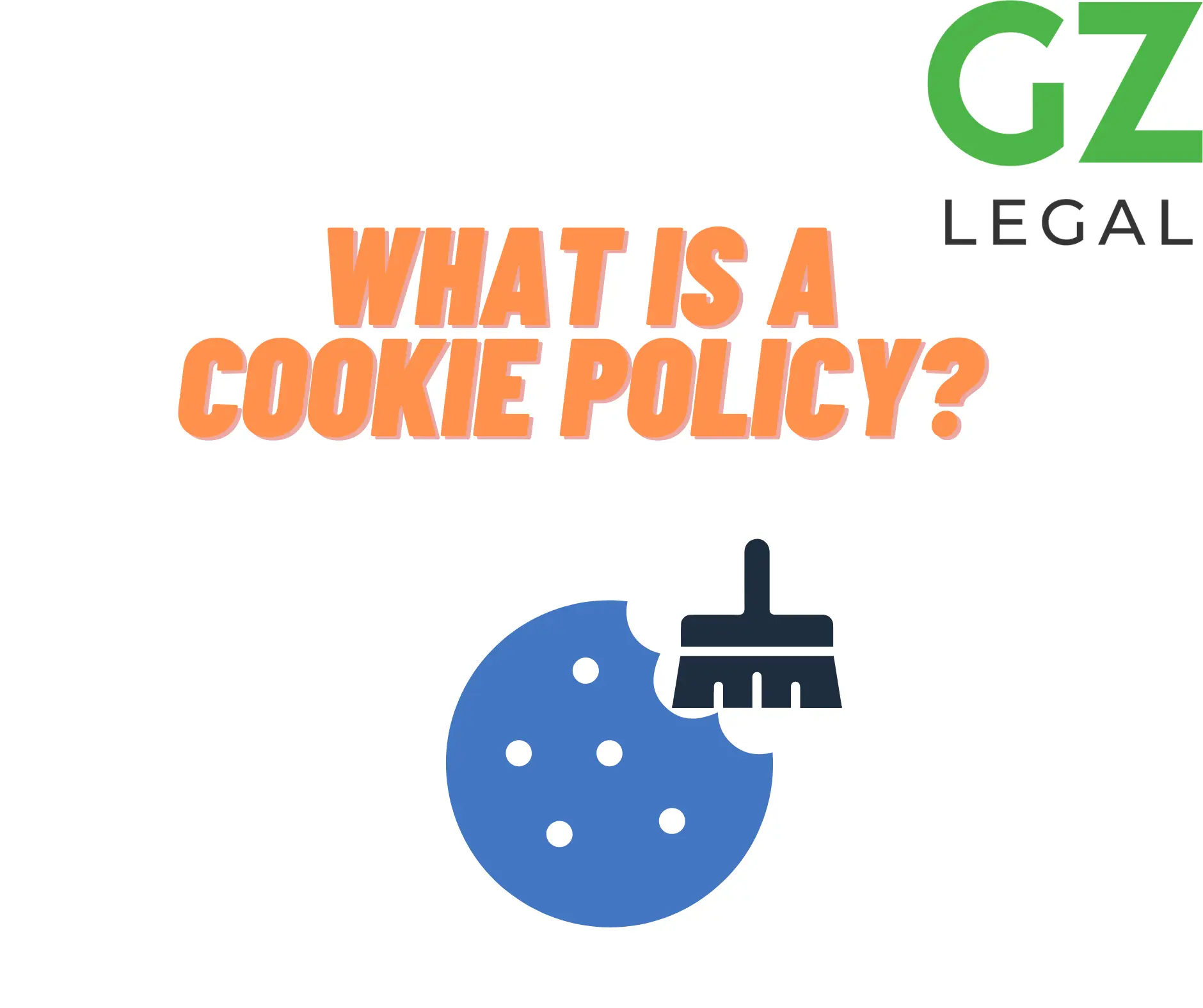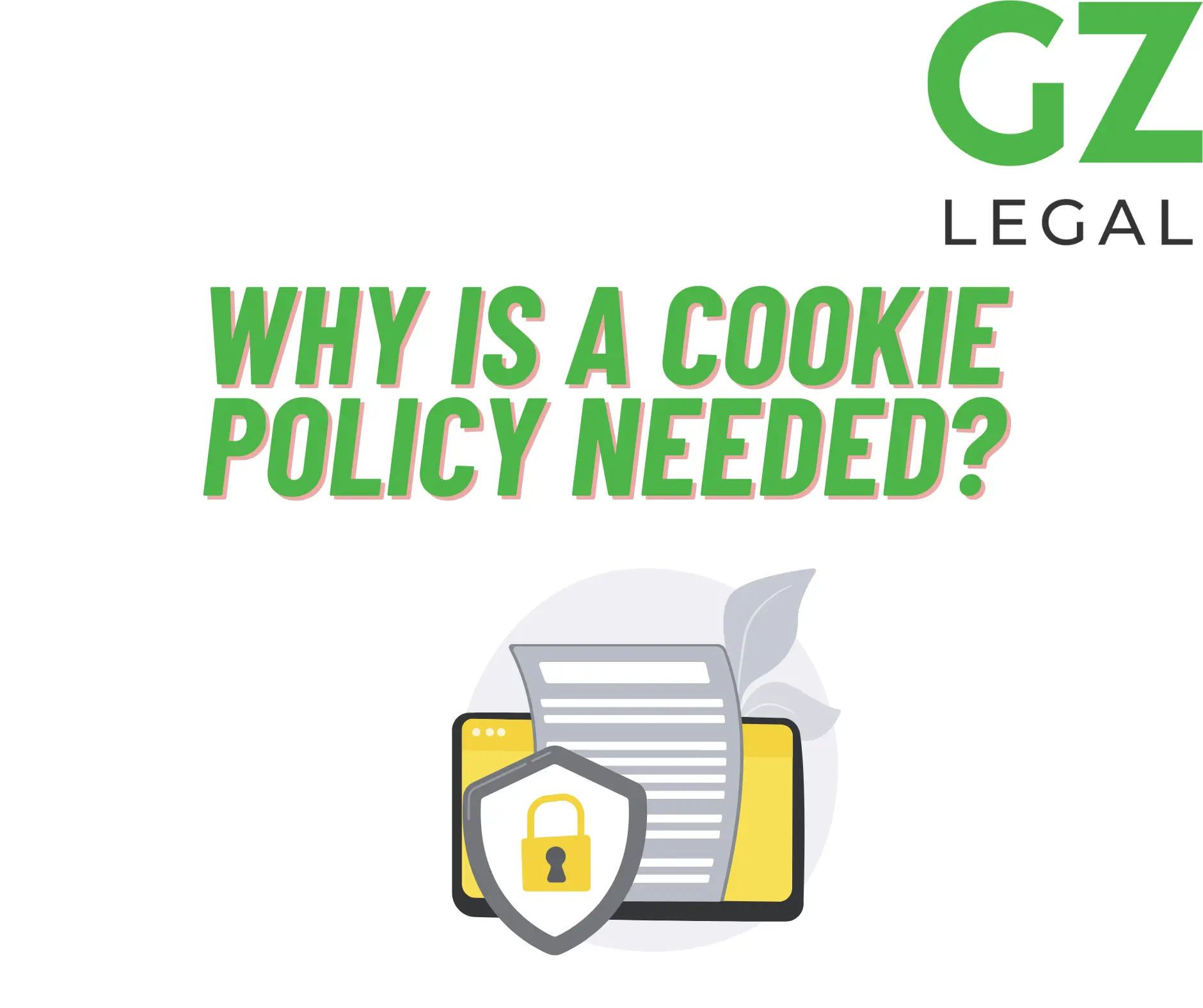Malcolm ZoppiSun Oct 15 2023
Do I Need a Cookie Policy on My Website? Essential Guidance for Compliance
A cookie policy is required on websites using cookies for compliance with international regulations.
Do I Need a Cookie Policy on My Website? Essential Guidance for Compliance

In today’s digital age, website owners must navigate various laws and regulations to ensure compliance, one of which is related to having a cookie policy. If your website uses cookies, which is the case for the majority of websites, it is imperative to understand the purpose and requirements for establishing such a policy.
A cookie policy is a legal document that informs your website’s visitors about how you use cookies and how their personal data is handled. This policy is essential not only for respecting user privacy but also for complying with international laws and regulations, such as the European Union’s General Data Protection Regulation (GDPR) and the California Consumer Privacy Act (CCPA).
Key Takeaways
- A cookie policy is required on websites using cookies for compliance with international regulations.
- Understanding cookie types and their functions is crucial for crafting a transparent policy.
- Non-compliance may lead to penalties and negatively impact your website’s accessibility.
What Is a Cookie Policy?

A cookie policy is a crucial element of a website, providing information to users about the types of cookies in use, their purpose, and the management of collected data. As a website owner, it’s essential that you understand what a cookie policy is and how it affects your website.
Cookies are small text files that websites store on a user’s device. They help website owners track user behaviour, preferences and improve the overall user experience. There are various types of cookies, including ‘essential cookies,’ which are necessary for a website’s proper functioning, and ‘non-essential cookies,’ which usually require user consent prior to their activation.
A cookie policy should clarify how your website uses cookies and explain the types of cookies you use—including first-party cookies set by your own website, and third-party cookies set by other services, like analytics tools. Furthermore, a cookie policy should inform users about the purpose of each cookie and the duration they are stored.
It’s vital that your cookie policy adheres to privacy regulations, such as the GDPR (General Data Protection Regulation) and the ePrivacy Directive of the EU or the UK’s ICO regulations. This means obtaining user consent for non-essential cookies prior consent and providing an option to adjust their preferences.
To create a clear and comprehensive cookie policy, it’s advisable to conduct a cookie audit. This helps you identify the cookies on your website and understand their purpose, ensuring that you provide accurate information to your users.
In conclusion, a cookie policy is an important aspect of being transparent about your website’s data collection practices and maintaining compliance with relevant privacy laws. Make sure to update your policy regularly, especially when there’s a change in your website’s cookie usage.
Why a Cookie Policy Is Needed

A cookie policy is essential for your website to ensure compliance with various data protection regulations and to maintain transparency with users. In particular, the General Data Protection Regulation (GDPR) requires websites to inform users about the collection and processing of their personal data, as well as provide options for users to manage their preferences.
By having a cookie policy in place, you demonstrate your commitment to protecting user privacy and personal data. Creating a clear and comprehensive policy session cookie using also helps you avoid potential fines and legal issues, particularly if you have visitors from the EU or other regions where data protection laws apply.
A well-crafted policy outlines the types of cookies your website uses, their purpose, and how the data is processed and shared. This transparency fosters trust between you and your users, encouraging them to engage with your website without concerns about their privacy.
Additionally, a cookie policy gives users the option to adjust their preferences, such as disabling or enabling specific cookies. This level of control empowers users and demonstrates that you respect their privacy.
In summary, incorporating a cookie policy on your website is vital for regulatory compliance, user trust, and data protection. By doing so, you not only protect your users’ personal data but also contribute to a more transparent online experience for them.
Understanding Different Types of Cookies

There are various types of cookies used by websites, each with its own purpose and function. To better understand their roles, this section categorises them into five main types: Essential Cookies, Preference Cookies, Analytics Cookies, Persistent and Session Cookies, and First and Third-Party Cookies.
Essential Cookies
These cookies are crucial for a website’s basic functions, such as navigation and security. They ensure that a site runs smoothly, enabling you to move around and use its features without any hassle. For example, essential cookies manage the user authentication process and remember your log-in credentials. Since these cookies are critical for a website’s operation, user consent is not typically required for their usage.
Preference Cookies
Preference cookies, also referred to as ‘functionality cookies’, are used to remember your personal settings and preferences on a website. These cookies store information such as your preferred language, your location, or other site-specific user preferences only. By doing so, they aim to provide you with a more personalised and user-friendly experience on a site. Although not crucial for the site’s core functionalities, these cookies significantly enhance your browsing experience.
Analytics Cookies
Analytics cookies collect information about your website usage, such as the pages you visit, the time you spend on them, and any errors you encounter. These cookies collect data are crucial for website owners to understand user behaviour patterns, identify website performance issues, and optimise their site accordingly. The data collected by analytics cookies is generally aggregated and anonymised, ensuring that users’ privacy is protected.
Persistent and Session Cookies
There are two types of cookies based on their duration: persistent cookies and session cookies. Persistent cookies remain on your device even after you close your browser, allowing a website to remember you and your preferences across multiple visits. These cookies typically have an expiration date, after which they will automatically be deleted.
On the other hand, session cookies are temporary and only exist while you browse a specific website. They are automatically deleted once you close your browser. Session cookies are commonly used to maintain the items in your shopping cart or keep you logged in during a single visit.
First and Third-Party Cookies
First-party cookies are those created and managed by the website you are visiting, helping it to provide a seamless and personalised experience for you. Third-party cookies, on the other hand, are created by parties other than the website you are visiting, such as advertisers or social media platforms. These cookies are often used for cross-site tracking, ad-targeting or social sharing functionalities.
In summary, understanding the different types of cookies and their purposes can help you better navigate and manage your online experience. Each type of cookie serves a specific function, from enabling basic site operation to improving your browsing experience and helping website owners optimise their content.
Law and Regulation Requirements
The GDPR
The General Data Protection Regulation (GDPR) is a comprehensive data protection law that governs how organisations handle personal data of individuals within the European Union (EU). If your website is accessible to users from the EU or you process their personal data, you must comply with GDPR regulations. This includes providing clear and transparent information about how you use cookies and complying with the requirement to obtain users’ consent for non-essential cookies. By doing so, you demonstrate your commitment to the protection of users’ privacy and ensure GDPR compliance.
The PECR
The Privacy and Electronic Communications Regulations (PECR) is a UK law that by data protection authorities sets rules on electronic communications, including the use of cookies and similar technologies. PECR requires website operators to provide transparent information on the use of cookies and obtain consent from users for deploying non-essential cookies on their devices. By adhering to PECR guidelines, you ensure that your website respects the privacy of its users and remains compliant with UK data protection laws.
The CCPA
The California Consumer Privacy Act (CCPA) is a data privacy law that governs how businesses handle the personal information of California residents. While the CCPA does not specifically mention cookies, it regulates cookie usage in a broader context through data collection and sharing practices. If your website is accessible to users in California or you process California residents’ data, you must follow the CCPA requirements. This includes providing a clear and comprehensive information privacy policy with transparent information about your cookie usage. By complying with the CCPA, you demonstrate respect for the privacy rights of California users and fulfill your obligations under California privacy law.
Setting Up a Cookie Policy
Defining Cookies and Their Use
To set up a cookie policy on your website, it is important to first define what cookies are and how they are used on your site. Cookies are small text files placed on a user’s device by websites to store information about their preferences and browsing behaviour. Examples of cookies include those used to remember user login details, track visitor activity, or deliver personalised content. To comply with privacy regulations like the GDPR and CCPA, it’s essential for your website to clearly disclose its use of cookies to visitors.
Providing an Opt-Out Option
Offering an opt-out option is a crucial aspect of your cookie policy. You should give users the choice to decline the use of non-essential cookies, such as those used for advertising or analytics purposes. Ensure that your website includes a user-friendly mechanism for visitors to manage their cookie preferences and provide instructions on how to disable cookies within popular web browsers like Chrome, Microsoft Edge, or Opera.
Displaying a Cookie Banner
Upon first accessing your website, visitors should be greeted with a visible cookie banner that informs them about your site’s use of cookies. The banner should include a clear and concise explanation of why cookies are used, which helps to establish transparency and foster user trust. It’s important to include an “I accept” button, allowing users to give their consent to the use of cookies, as well as an “I decline” button to opt-out of non-essential cookies. Providing a link to your full cookie policy within the banner is also advisable. Many plugins are available to help you create user-friendly cookie banners for your website.
Detailed Information About Third Parties
Your cookie policy should not only inform users about the cookies you use but also explain any third-party cookies or services that your site employs. This could include advertising networks, social media plugins, or analytics tools. Be sure to list each third party that uses cookies on your website, explain their purpose, and provide links to their respective privacy policies.
By adhering to these guidelines, you can set up a comprehensive cookie policy that complies with privacy regulations and empowers your visitors to make informed decisions about their cookie preferences.
Consequences of Non-Compliance
If you fail to comply with the appropriate and cookie law and regulations, there are several consequences that you may face. It’s important to understand these penalties to ensure your website remains compliant and avoids any legal issues that may arise due to non-compliance.
Firstly, fines may be imposed on your business or organisation if you do not adhere to the cookie rules set by regulatory bodies. In the European Union, for example, under the General Data Protection Regulation (GDPR), fines can be as high as €20 million or 4% of your global annual turnover, whichever is higher. It’s important to consider the financial implications of non-compliance.
Secondly, penalties can include more than just fines. Breaching cookie regulations can result in legal actions taken against your organisation, which may lead to a damaged reputation, loss of customer trust, and a decline in business value.
Thirdly, non-compliance can lead to an upsurge of complaints from your users. If your website visitors feel that their privacy rights are being infringed upon, they may lodge complaints with a regulatory body or take legal action themselves. These complaints can create negative publicity for your business and harm your customer relationships.
To avoid these consequences, it is essential to ensure your website maintains compliance with the relevant cookie laws and regulations. Conducting regular cookie audits, informing users about the cookies your website uses, and obtaining their consent are crucial steps in achieving compliance.
In conclusion, the consequences of non-compliance should not be underestimated. By ensuring your website follows the necessary regulations, you can protect your business from fines, penalties and the negative impact of customer complaints. Consistently maintaining compliance will help your organisation maintain a trustworthy relationship with its users and uphold a positive reputation.
Tools and Assistance for Creating a Cookie Policy
In this section, we will explore various tools and assistance available for creating a cookie policy for your website. The primary focus will be on the use of policy generators and WordPress plugins.
Policy Generators
Utilising separate cookie policy generators can simplify the process of creating a cookie policy for your website. Many online services offer customisable templates that take into account various legal requirements and jurisdictional differences. Some popular cookie policy generators include:
- Iubenda: Iubenda offers a comprehensive solution for generating a cookie policy that complies with GDPR, CCPA, and other privacy regulations. They provide a user-friendly interface to help you tailor the policy based on your website’s specific requirements.
- Termly: With Termly, you can generate a customisable cookie policy by answering a series of questions about your website. Termly’s policies are designed to comply with the GDPR, CCPA, and other privacy laws.
These generators can save you time and effort while ensuring your policy remains legally compliant.
WordPress Plugins
If your website runs on WordPress, there are several plugins available that provide cookie policy management solutions. Here are a couple of noteworthy options:
- Cookie Notice by dFactory: This plugin enables you to display a customisable cookie consent banner on your website, allowing users to accept or decline cookies. It is designed to help you comply with GDPR, CCPA, and other privacy regulations. Additionally, the plugin can integrate with popular analytics services like Google Analytics.
- WP GDPR Compliance: The WP GDPR Compliance plugin aims to make your WordPress website fully compliant with GDPR requirements. It supports a variety of popular WordPress plugins such as Contact Form 7, WooCommerce, and Gravity Forms. The plugin comes with an easy-to-use setup wizard, enabling you to start generating and implementing your cookie policy quickly.
Cookie Audit
Performing a cookie audit helps ensure that you are compliant with the relevant privacy laws. It involves identifying all the cookies your website uses and categorising them based on their purpose. A proper cookie audit will help you understand the data collected by your website and identify any third-party cookies in use. It’s important to continually update your cookie policy as changes occur, which is where policy generators and WordPress plugins can provide valuable assistance.
Providing Clear and Transparent Information
It is essential for your website to provide clear and transparent information to its users regarding the use of cookies. This information should explain why you are processing their personal data, how long you will retain it, and with whom you will share it.
When implementing a cookie policy, it’s important to be confident and knowledgeable about the purpose of each cookie you use. Start by conducting a thorough cookie audit to identify the types of cookies you employ, whether they require consent, fall under the ‘strictly necessary’ exemption or require explicit consent.
To achieve proper transparency, integrate a clear and accessible privacy notice into your website. You can devise your own privacy notice using a simple template. Ensure that your privacy notice is readily available and easily comprehensible, as users should understand the information you are providing. In cases where children are likely to access your online service, take extra care in crafting a clear and age-appropriate explanation of your cookie usage.
In practice, request and gain consent for the use of cookies through user-friendly mechanisms such as message boxes and dialogue prompts. Keep in mind that cookie consent should be easy to give and withdraw. Furthermore, it is crucial not to store user data for longer than necessary or share it with third parties without explicit consent.
In summary, a well-designed cookie policy encompasses transparency in data collection and processing, informed consent, user understanding, and mechanisms for obtaining consent and granting and revoking consent. By adhering to these guidelines, your website will comply with privacy laws and demonstrate a commitment to protecting user data.
Frequently Asked Questions
What are the requirements for website cookie policies?
The requirements for website cookie policies vary depending on the location and jurisdiction of your business. Generally, a cookie policy should inform users about the types of cookies used, the purpose of using cookies, how your website collects data, and the third-party services involved in data collection. Additionally, you should give users the option to accept, reject, or modify the cookies they want to enable on your website, ensuring that users are informed and have control over their own data.
Is a cookie policy mandatory for US-based websites?
For US-based websites, although there isn’t a specific law requiring cookie policies, complying with privacy regulations like the California Consumer Privacy Act (CCPA) is essential. These regulations generally necessitate transparent disclosures of your data collection practices and the protection of users’ privacy. Ensuring your website has a compliant cookie policy and allowing users to make informed decisions about their data is essential in fulfilling these obligations.
How do Google Analytics and cookies relate?
Google Analytics uses cookies to collect visitor data in order to provide website owners with valuable insights on their traffic and user interactions. These cookies help store information, such as the user’s browser settings, device, and session duration, which aids in tracking unique visits and analysing behavioural patterns. It’s crucial to include information about Google Analytics cookies in your cookie policy and to obtain users’ consent when collecting data through these cookies.
Are Wix and WordPress websites subject to cookie policy regulations?
Regardless of the platform used to create your website, such as Wix or WordPress, you are subject to cookie policy regulations if your site uses cookies. Both platforms offer various features and plugins to help you effectively implement and manage your cookie policy. However, it’s your responsibility to ensure that your website complies with all applicable privacy regulations and has a clear, transparent, and easily accessible cookie policy.
Is it necessary to obtain consent for essential cookies?
Essential cookies, also known as strictly necessary cookies, are used for crucial functions such as maintaining a user’s session and ensuring the security of your website. Since these cookies are deemed necessary for the basic operation of your site, you do not need to obtain user consent for their use. However, it’s still a good practice to include information about essential cookies in your cookie policy so that users are aware of their purpose.
What is the ICO’s guidance on rejecting all cookies?
The Information Commissioner’s Office (ICO) recommends that your website should provide users with an option to reject all non-essential cookies. This allows users to make informed decisions about their data and ensures their privacy is respected. Bear in mind that this guidance, while helpful, may not encompass every jurisdiction your website serves, so it’s crucial to explore and adhere to the privacy regulations specific to your location.
Find out more!
If you want to read more in this subject area, you might find some of our other blogs interesting:
- Step-by-Step Guide on How to Transfer Shares to a Holding Company
- Breach of Settlement Agreement: Consequences and Remedies Explained
- Who Gets the Money When a Company is Sold?
- What is a Counter Offer in Contract Law? Explained Simply and Clearly
- Understanding the Costs: How Much Do Injunctions Cost in the UK?
Disclaimer: This document has been prepared for informational purposes only and should not be construed as legal or financial advice. You should always seek independent professional advice and not rely on the content of this document as every individual circumstance is unique. Additionally, this document is not intended to prejudge the legal, financial or tax position of any person.